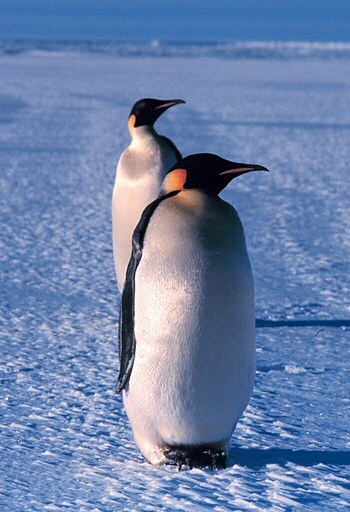 |
| Emperor Penguins in the Ross Sea, Antarctica (Photo credit: Wikipedia) |
The Emperor penguins are by far the largest species found around the world. They live in the very cold weather of Antarctica. They are exceptionally beautiful creatures with the traditional black and white we are all familiar with. They have some very colorful features on their faces too though. Emperor penguins have Orange spots on their necks and their beaks. They also have yellow on their breast and ears.
Empower penguins eat very well from the fish in the ocean. They also consume squid when they are available. Emperor penguins are excellent hunters as they can swim rapidly underwater. They can also hold their breath underwater for up to 18 minutes which is really amazing.
They have very harsh lives though in many regards compared to other species of penguins. If you have watched March of the Penguins then you already know how they trek for long miles in the harsh winter without food to the breeding grounds. They have a very high mortality rate as the cold can kill their eggs. The mother and father are often on the edge of starvation and yet they do all they can to bring their young into the world.
The average lifespan for the Emperor penguin in the wild is about 20 years. The toll of the long winters and extensive travels really take a toll on them. Those that have been placed in captivity though live to be approximately 50 years old. They generally are able to remain in very good health while in captivity without any ongoing problems.
In order to communicate with each other, this species of penguins are able to make a variety of sounds. Each penguin is very unique in pitch and that is how they recognize each other. The young are able to remember what the sound of their parents is so they can easily find them.
They are very social creatures and enjoy the company of each other. They can be competitive at times but for the most part, they get along well with each other in the colonies. They treat their young extremely well and will go to great lengths to get them the food and care they need in order to survive.
